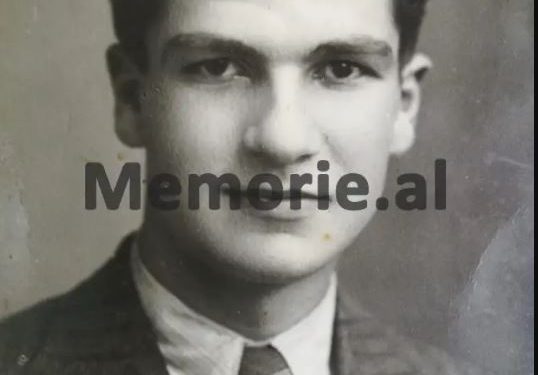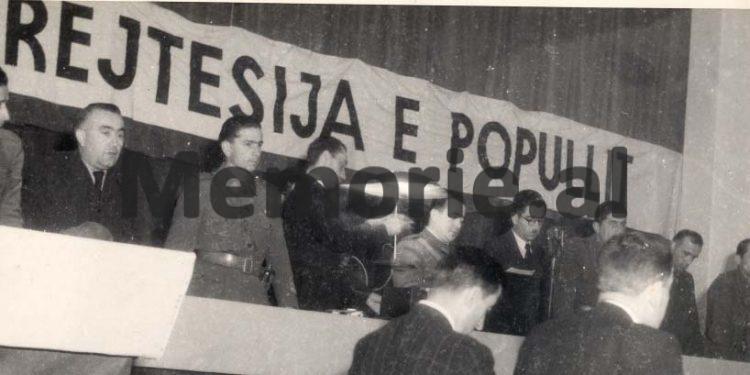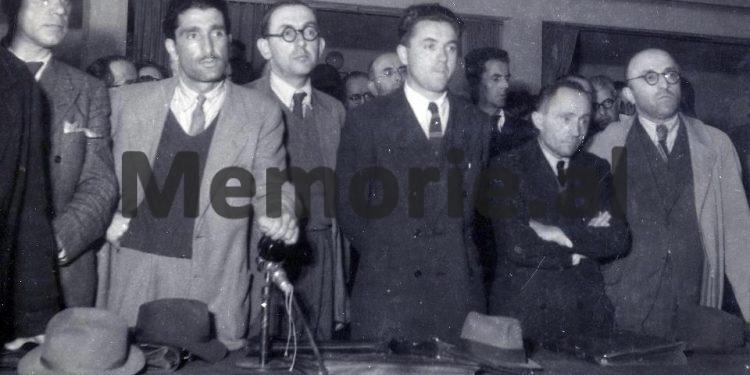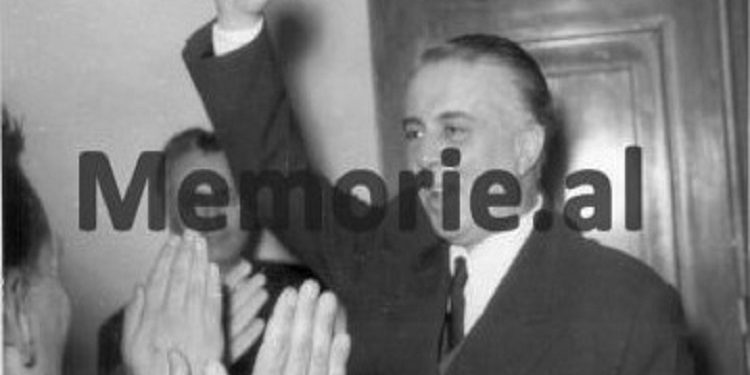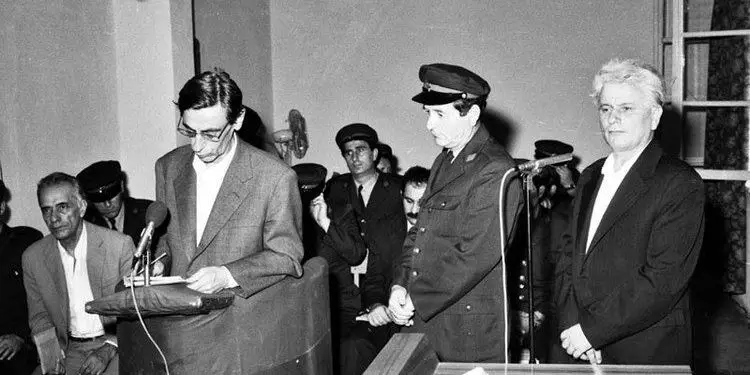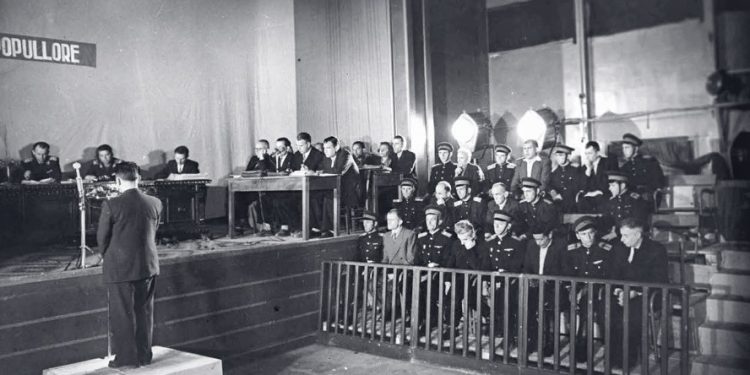From Femi Sufaj
– The educational level of all prosecutors and investigators in the years 1953-1958 was as follows: With primary education; 52.13%, with Unique school; 56.65%, with secondary education; 18.21 % and higher; 23.45 %.-
Memorie.al/ The weakening of the positions of the Albanian state as a result of cutting off relations with the Soviet Union forced the political leadership of our country to take some necessary steps to survive. In foreign policy, as is well known, the course taken consisted of choosing a new boss. In domestic politics, the measures taken are known as the revolutionization of domestic life. These measures were for the strengthening of the party’s leadership role, the fight against bureaucracy, the reduction of the administrative apparatus, the connection with production and the implementation of the line of measures, etc. In their essence, all these measures had only one goal; increasing control of the party and the communist dictator, over all powers and over the individual.
In this campaign that was led by the party and personally by its leader, Enver Hoxha, on 06.09.1966 at the meeting of the Political Bureau, it is the turn of the Ministry of Justice and the institution of advocacy to be suppressed. This meeting was not intended to make cuts in a ministerial cabinet, or reform as is usually the case, but to strike justice by bringing it under the absolute control of the party. To understand it more clearly, we are giving a part of Enver Hoxha’s speech at this meeting.
Enver Hoxha’s speech at the Politburo meeting on September 6, 1966, about the suppression of the Ministry of Justice and Advocacy
“We are discussing the issue today, that the Ministry of Justice should exist, or not? The question is whether it should exist, to keep it with the powers it has, or to increase it, i.e., to give it others Or maybe we don’t need it at all and we should suppress it? This issue is brought up for discussion today. As a socialist country in dynamism, based on Marxist-Leninist principles, the experience we have gained, for the Ministry of Justice, today we have reached some conclusions, which we call rights, based on which we will have to take the relevant measures. But we do not reject the past, the positive side of this institution, because this is also part of the whole.
…We are right about the Constitution and the administration of justice. In the event that a problem arises, that we do not have the basis right, i.e., the principle clearly accepting that; The Supreme Court has the right to make decisions, but no one can interfere with them, not even the government that leads the entire political, economic and cultural life of the country, and according to this point of view, it should also lead justice, then according to this point of view, it comes out that even the Ministry of Justice, which is a part of the government, should have powers in this regard. According to such judgment, the government should also run the courts. Such an extension of the problem attacks our legislation, attacks the laws and the Constitution.
During its time, the Ministry of Justice has played a positive role, not because it was headed by one person or another, but because our popular justice expresses the straight line of the party and the aspirations of the people, because like every sector, justice has always been led by the party…! If we think that the Ministry of Justice is being destroyed, the dictatorship of the proletariat has weakened; it means that we do not understand what the functions of one or the other organ of the dictatorship of the proletariat are.
The Ministry of Justice is not the headquarters of the dictatorship of the proletariat. This headquarters consists of the Congress, and the Central Committee. The Party and the Central Committee have given powers to the Political Bureau, the Government, the Presidium of the People’s Assembly, the Supreme Court and the Ministry of Justice, to act on the basis of their directives. So the head of the dictatorship of the proletariat is the Party Congress and the Central Committee, not the Ministry of Justice.
To also think that the courts and the Supreme Court are independent from anyone and to say on the other hand that they should be dependent on the government, this means denying the direction of the Presidium of the People’s Assembly over the Supreme Court and even worse to deny the role of the party to intervene to correct the decisions taken by the court, when they are not right, to deny the role of the party and the Presidium of the People’s Assembly, for the administration of justice.
How should we understand the powers of the Political Bureau and the Presidium of the People’s Assembly? In the event that the Political Bureau will receive a report on errors in the activity of the Supreme Court, it cannot make a decision directly. The matter should be raised in the state way, because we are a state and we are based on laws.
In such a case, the Political Bureau, after examining the case, instructs its members who are also members of the Presidium of the People’s Assembly, to raise this issue when they come to the Presidium meeting, after having previously spoken with the President of the Presidium, which is also the member of the Central Committee of the Party, on behalf of the Political Bureau, to raise the issue.
It is the Presidium of the People’s Assembly that has the right to call the Supreme Court and demand an account for an unjust decision. The Presidium also has the right to revoke the law and propose to dissolve the Supreme Court. The Assembly takes the decision. Based on the spirit of the party and the Constitution, the laws of people’s power, benefiting from the experience of the Soviet Union and the teachings of Lenin, we have given these bodies powers that they must implement.
We have determined that the courts are independent in the decisions they make. But it is known that the Supreme Court is elected by the Assembly, as well as other high bodies. Even the lower courts are not chosen by the Minister of Justice, but by the people. Therefore, it cannot be said that the courts are independent and unaffected by anyone. None of us is independent from the party line and the issue of the people, and the Constitution has solved this issue correctly.
The courts below are not independent. When I deem it necessary, I can call the judge, the secretary of the party, or the chairman of the Executive Committee, and let them examine the situation that a murder has created in the party and in the people, and what is the opinion of the party and the people, for this matter. It cannot be thought that the courts are not influenced by the opinion of the party and the people on this issue.
As long as the judge accepts the voice of a witness and this is mandatory, then the voice of the whole mass and even more so the party must be heard. On the basis of this opinion, the judge must decide correctly and in a revolutionary way. It can mean that a law is not complete, this gap, the judge must prove exactly with the opinion of the party and the masses. A judge must always make decisions in accordance with the spirit of the party and the interests of the people.
When a murder is committed, we cannot make a fair decision without examining the case, so we first ask the party and they give us information and their opinion. Even the Supreme Court, as long as it has the right of recourse, cannot be deprived of going down to control, help and inspire the courts, along party lines. Even the government should control the courts. The Chairman of the Council of Ministers is a member of the Political Bureau, i.e. on the party line.
It is true that we did not study law, but we have been involved in the implementation of the right party policy for 25 years, we also make laws, therefore the 25-year school of the party that we have completed cannot be compared to 25 law universities. As far as advocacy is concerned, I have long been of the opinion that this function should be abolished. Who does the lawyer protect in us?! Who is he fighting against?!
Against our popular justice! In essence, in our country, it is envisaged that popular justice will protect the interests of the people, without forgetting the interests of the one who is the defendant. When this is the case, why should we let some lawyer, Suat Asllani or Koço Dilo, come out and defend a criminal or thief before the popular courts. Why do we need such people?!
In the West it is different; the lawyer there defends people who are politically and economically oppressed by the bourgeois power. Everyone knows that the party solves cases without a lawyer, even much more important and delicate problems, without taking people to court at all. So, while in our courts we have party organizations and people, determined and revolutionary, to implement popular justice, why is it necessary to have lawyers?!
These, a criminal who does not need to be exonerated, try to exonerate him, that is, they do not act rightly. And if the task is to mitigate the guilt, it is mitigated by our people’s court, with party spirit and clear conscience. Then why should we listen to the voices of bourgeois lawyers, like the ones I mentioned?
In bourgeois countries, e.g. in France, the laws are a big forest. First of all, Napoleon’s code is in force there, but there are still many other laws in force there, drawn up centuries ago, from those of the 16th and 17th centuries. The defendant in France has no way of knowing about these laws, to be able to defend him, to get out of this dense forest, and to escape the accusation.
How different is the situation in our country. We fight first, for the laws to be simple. For their recognition, great work and propaganda is done, so that the essence is understood by all people. In our country, efforts are also made to raise the masses politically and ideologically.
In addition to all these, under the leadership of the party, we also tell the court to apply this or that law in a revolutionary way, with full justice, in the interest of the people. All these things do not exist in bourgeois countries; therefore what I say is all against the law. As it emerges from the discussions, everyone agrees that the Ministry of Justice should be abolished, we just have to think about what organization should be created next to the Prime Minister’s Office and the People’s Assembly”.
When Enver Hoxha ordered military courts?
By Decision no. 144 of the Political Bureau of the Central Committee of the PPSh, dated 06.09.1966, the Ministry of Justice was abolished and the powers passed to the Supreme Court. In this way, the attack against the institution of justice and the protection of individual rights was finalized. Complete control of the party was established, over the judiciary and human freedoms and rights.
This process had started with the installation of the Communist Party in power. They are documented with dozens of cases, of the intervention of the party and the dictator himself, on the judiciary, with concrete orders, for harsh punishments against his opponents, who were labeled; “enemies of the people”.
On October 1, 1946, the Ministry of National Defense, with an order signed by Enver Hoxha, in the capacity of Supreme Commander of the Armed Forces, addresses the military courts, which states: “All the soldiers arrested in the divisions, immediately go before the military court and the sentencing decision, to be announced by October 5, 1946”.
Within this date, hundreds of soldiers of various levels were sentenced to long prison terms and death sentences. Thus, the Gjirokastra Military Court informed the Ministry of Defense that it has sentenced 33 soldiers, 8 to death, 24 to imprisonment and 1 is declared innocent. Such announcements come from all military courts.
The legal institution almost ceased to exist!
The institution of advocacy had almost ceased to exist long before this meeting of the Political Bureau. The lawyers had practiced their profession under unimaginable pressure, not only from the artificial obstacles that were put out by the prison administration, investigators and employees of the Internal Affairs and Security Branches, but also from the legal restrictions.
In the report of the Council of Ministers, on 27.08.1956, “On criminality and the activity of the judiciary”, it is stated that; in the whole Republic, there were approximately 140 lawyers, “the vast majority of them, are cultured elements of the bourgeois schools and with a lot of rubbish from the past”! (AQSH, P.890 D.64, V.1956, p. 28).
By decision no. 57 dated 22.04.1967 of the Political Bureau of the Central Committee of PPSh: “On the suppression of advocacy”, the institution of advocacy was removed, with the motive that; “courts and prosecutions, as organs of the people and of the dictatorship of the proletariat, protect the laws and socialist legality and the rights of citizens, and that advocacy as a profession, in the conditions of our country, is not seen as necessary”.
Most of the lawyers were sentenced, persecuted and sent to production, in the most difficult jobs, while most of the justice workers were uneducated, just militants. In a statistic from December 1947, it was learned that 22 lawyers, 8 judges, 4 notaries, along with other categories of employees, of all specialties were imprisoned.
We recall that in 1957, the General Prosecutor had a lyceum (secondary general education) and the prosecutor had a primary education. At this level, there were also other employees of these institutions. The indoctrination of justice workers aimed at using them as a weapon to protect the dictator’s rule.
This is how a prosecutor expressed himself, at the Prosecutors’ Conference, on 06.08.1952: “…we are in a sea of illegality and that in this sea, we have all entered, but in order to get out, we must be guided by the Party’s policy, for it to be the compass of our work, we must orient ourselves and adopt Soviet science and experience….”! (A.Q.SH. P. 492. Year 1952, D.6)
The discussion of the dictator in front of the members of the Political Bureau, has no philosophical or legal value, but reminds of the role of the monarch of the early Middle Ages, who decided on everything. Memorie.al




